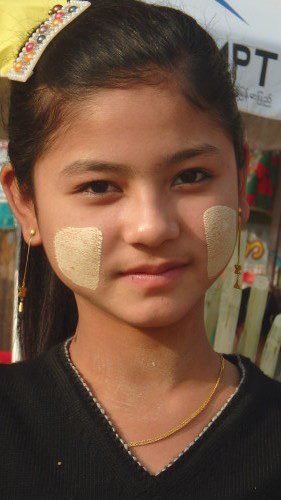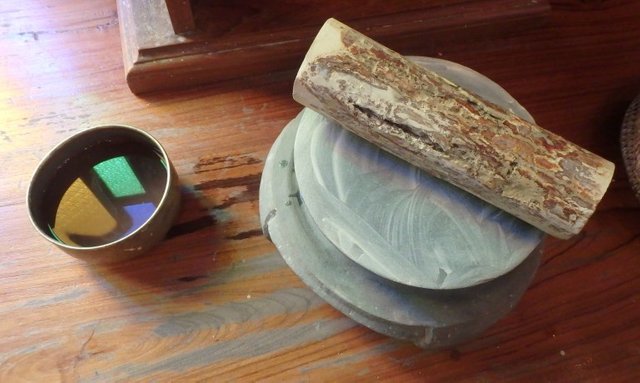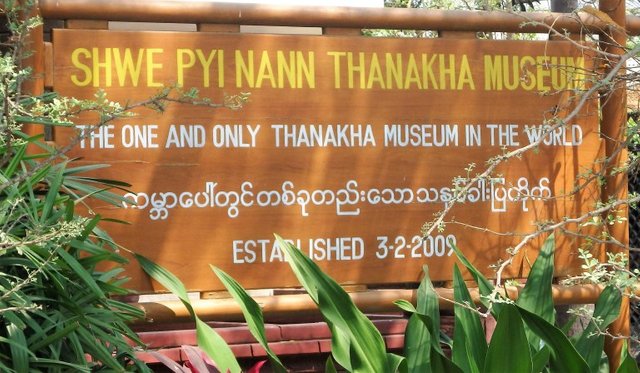Myanmar: the Beauty of Thanaka

Upon your arrival in Myanmar (Burma), you’ll soon notice something very odd. Just about every female, from youngest child to oldest grandmother, is wearing a strange creamy paste on her face. And several younger men are pasted up, as well. What you’re seeing is an ancient Burmese institution: thanaka!
Thanaka (pronounced ‘ta-na-KA’) is a paste made from the ground-up bark of a tree that commonly grows in the central plains of Myanmar. How it got started, no one knows for sure but a legendary queen of Beikthano who lived in Pyu city 2,000 years ago, was a lover of thanaka and helped to boost its popularity. Whatever its origins, Thanaka has a long history that has been celebrated in poems and writings and has been used by the Burmese in many ways for millennia.
I have to admit that I found this thanaka thing to be quite shocking at first. Why would women cover up their beautiful faces with some ridiculous yellow paste? Aren’t mudmasks or the like something people normally wear at night? As I discovered more about thanaka, however, my attitude changed and I started to see the beauty of it.
Thanaka can be applied to the arms, legs, or any area of skin that might get exposed to the sun, but most often, it’s simply applied to the cheeks and nose. It can be smeared on as a simple blob on the cheek or it can be painted on in more artistic and intricate patterns, such as a leaf with veins drawn in by dragging fingernails through wet paste.
One of thanaka’s most logical uses is protection from the fierce tropical sun. Not only does it act as an all-natural sunblock but it also has a cooling effect and prevents dehydration. For something that’s applied to the skin daily for whole lifetimes, it is far better to use a natural organic substance than some artificial chemical-based sunscreen.
For most Burmese people, thanaka is the only makeup they ever use. It’s an all-in-one substance that makes the skin smooth, prevents aging, and controls excess skin oils that lead to blemishes. Thanaka is a deep cleanser that removes impurities from the pores leading to a cleaner complexion. It lightens the skin in a part of the world where people value fair skin. It also serves as a perfume with its light sandalwood-like scent. Many say that, thanks to thanaka, Burmese women have the softest facial skin in the world!

The wondrous claims don’t stop there. It is claimed that thanaka has antioxidant, anti-fungal, anti-bacterial, and anti-inflammatory properties. It allegedly helps to reduce free radicals helping to resist skin cancer. The leaves are used in a poultice for healing skin sores and have been used in treatments for leprosy, malaria and epilepsy. The sour, bitter fruit has been used to treat poisoning and the thanaka root is believed to be good for stomachache, heart disease, and rheumatism. It is also a key ingredient in ayurvedic medicine and even repels mosquitos! Many use it at night, claiming it promotes a restful sleep. Studies are on-going as to how accurate these claims are but clearly, it’s a versatile substance worthy of further study.

In Bagan, the site famous for thousands of pagodas, there is a free museum dedicated to Thanaka. When I visited, the curator demonstrated the process of making the cream. She put a few drops of water on a small rounded grinding stone (the kyauk pyin), then took a piece of wood about the size of her forearm and started vigorously rubbing its bark on the stone. Soon a bit of moist creamy yellowish-white paste accumulated. The excess water ran off into the groove around the stone’s perimeter. She applied some of the smooth, pleasantly scented paste to my cheeks. When I went outside into the hot noonday sun, my cheeks did indeed feel cooler.
Thanaka trees must grow to an age of at least 35 years before they are ready for use. Short logs are cut and sold directly to users. Thanaka is unique in the world of cosmetics in that most users make their own! For busy people, ready-to-apply pastes or powders are readily available everywhere in Myanmar. Some commercial preparations add other ingredients such as lemon, bark of lemon apple, roots and other herbs but the pure thanaka paste is all that is really needed. Some Thai spas have begun using the commercial preparations in their treatments. Outside of the country, one can obtain commercial preparations of thanaka in Asian markets or on-line.
Myanmar is undergoing tremendous change as it opens its doors to the world. Undoubtedly, westernization will have a negative effect on the use of thanaka as younger girls are already showing resistance in wearing it. Competition from foreign cosmetics may also take its toll. On the other hand, perhaps the rest of the world will discover the healthful benefits of thanaka and start to use it more in place of more expensive, artificial cosmetics.
A walk through a morning market anywhere in Myanmar will show such a widespread use of thanaka that it clearly won’t disappear anytime soon. Buddhists, Muslims, Hindus, Christians, dark skin, light skin, no matter what their appearance or beliefs, thanaka is worn by just about everyone. It’s almost a visual unifying statement: ‘We are all equal, we are all beautiful.’
Hi! I am a robot. I just upvoted you! I found similar content that readers might be interested in:
http://www.curiositychase.com/tag/thanaka/
You got a 1.02% upvote from @mercurybot courtesy of @cavesson!
You got a 1.75% upvote from @upmewhale courtesy of @cavesson!
You got a 2.05% upvote from @nado.bot courtesy of @cavesson!
Send at least 0.1 SBD to participate in bid and get upvote of 0%-100% with full voting power.